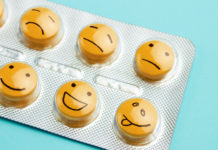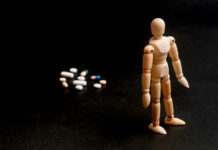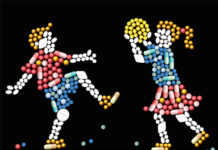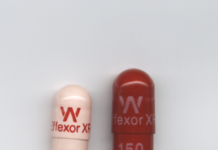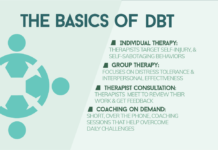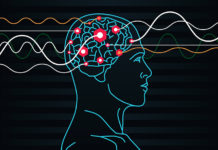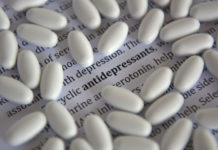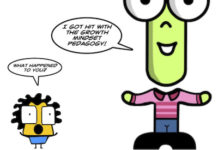“Virtual Autism” May Explain Explosive Rise in ASD Diagnoses
New clinical case studies have found that many young children who spend too much screen time—on TV’s, video games, tablets and computers—have symptoms labeled as “autism.” When parents take away the screens for a few months the child’s symptoms disappear.
Transcranial Magnetic Stimulation No Better Than Placebo for Treatment-Resistant Depression
A new study in JAMA Psychiatry found that transcranial magnetic stimulation was no better than placebo for treatment-resistant depression.
Study Deems Support, Not Drugs, Best for Youth at Risk of Psychosis
Research by five U.K. universities across multiple sites for up to two years divided 288 young adults (14-35 years) deemed at risk for psychosis...
Do Antidepressants Work? A People’s Review of the Evidence
After a meta-analysis of RCTs of antidepressants was published in Lancet, psychiatry stated that it proved that "antidepressants" work. However, effectiveness studies of real-world patients reveal the opposite: the medications increase the likelihood that patients will become chronically depressed, and disabled by the disorder.
How “Mental Health Awareness” Exploits Schoolchildren
Imagine being a parent at a meeting with educators to discuss Johnny's academics or behavior. Suddenly, your child’s teacher is telling you that he needs to see a doctor for an assessment of a suspected “mental disorder,” which usually leads to a prescription for medication. Warned of “the risks against failing to intervene,” you will likely acquiesce.
Q&A: How Can I Motivate My “Deadbeat” Teenager?
My 19-year-old son has been diagnosed with ADHD, depression, and ODD. He refuses to go to school or get a job; instead, he just hangs around and plays video games. He has prescriptions but refuses to take them. Frankly, he contributes nothing to the household but stress and is a bad role model for his siblings. How can I make him take his meds and shape up?
Suicide in the Age of Prozac
During the past twenty years, the American Foundation for Suicide Prevention and American psychiatry have adopted a "medicalized" approach to preventing suicide, claiming that antidepressants are protective against suicide. Yet, the suicide rate in the United States has increased 30% since 2000, a time of rising usage of antidepressants. A review of studies of the effects of mental health treatment and antidepressants on suicide reveals why this medicalized approach has not only failed, but pushed suicide rates higher.
New Study Casts Doubt on Efficacy of Ketamine for Depression
A new study, published this month in the Journal of Affective Disorders, investigated the effectiveness of weekly intravenous ketamine injections as a treatment for...
Q&A: Is My Child Being Overdrugged?
My eight-year-old daughter has diagnoses of ADHD, depression, anxiety, and ODD. She is taking four prescribed drugs, but she is still suffering and her behavior hasn’t changed much. Her doctor is suggesting adding yet another med. I’m wondering how many drugs are enough? I am starting to think she should go off some of them. I want to trust the psychiatrist, but I’m just not sure anymore.
Study Finds Hearing Voices Groups Improve Social and Emotional Wellbeing
Hearing Voices Network self-help groups are an important resource for coping with voice hearing, study finds.
Hereditary Madness? The Genain Sisters’ Tragic Story
The story of the Genain quadruplets has long been cited as evidence proving something about the supposed hereditary nature of schizophrenia. But who wouldn’t fall apart after surviving a childhood like theirs? The doctors attributed their problems to menstrual difficulties or excessive masturbation — anything except abuse.
Victim Blaming: Childhood Trauma, Mental Illness & Diagnostic Distractions?
Why, despite the fact that the vast majority of people diagnosed with a mental illness have suffered from some form of childhood trauma, is it still so difficult to talk about? Why, despite the enormous amount of research about the impact of trauma on the brain and subsequent effect on behaviour, does there seem to be such an extraordinary refusal for the implication of this research to change attitudes towards those who are mentally ill? Why, when our program and others like it have shown people can heal from the effects of trauma, are so many people left with the self-blame and the feeling they will never get better that my colleague writes about below?
Starvation: What Does it Do to the Brain?
The Minnesota Starvation Experiment was conducted at the University of Minnesota during the Second World War. Prolonged semi-starvation produced significant increases in depression, hysteria and hypochondriasis, and most participants experienced periods of severe emotional distress and depression and grew increasingly irritable. It really should not be a surprise to this audience that the brain’s functioning is highly compromised when the body is being starved of food (and nutrients). What we wonder is whether eating a diet of primarily highly processed foods low in nutrients has similar effects.
Peer-Support Groups Were Right, Guidelines Were Wrong: Dr. Mark Horowitz on Tapering Off Antidepressants
In an interview with MIA, Dr. Horowitz discusses his recent article on why tapering off antidepressants can take months or even years.
Researchers Search for Subgroups Where Antidepressants Are More Effective
The researchers theorized that this increased effectiveness was due not to “antidepressant” properties, but rather to the drug’s side effects, which include insomnia, drowsiness, and nausea.
Dialectical Behavior Therapy Reduces Self-Harm and Suicide Attempts
A new meta-analysis finds that DBT reduces self-harm, suicide attempts, and reduces the frequency of psychiatric crisis service utilization.
Neurofeedback is Not For Everyone: The Dangers of Neurology
One thing I noticed, from the moment that I stepped out of my psychiatrist’s office, was how strangely blank and yet clear my mind was. I felt surprisingly calm and relaxed, and I decided to go back for another treatment the next week. What I couldn’t have known then was that after that next “treatment,” life would be completely destroyed for me.
NICE Guideline Update Acknowledges Severe Antidepressant Withdrawal
A new update to the NICE guideline for depression suggests providers discuss long-term, severe antidepressant withdrawal symptoms.
Mental Health in Black and White
When I looked through my mountains of medical records, I saw that the providers who listed my race as black applied diagnoses like major depressive disorder and PTSD. The providers who saw me as white preferred diagnoses of panic disorder and borderline personality disorder. Of course, my experiences are just anecdotal. But if racial bias due to subjective experiences of practitioners can play such a large role in mental health diagnostics, how is this even considered a scientific discipline?
New Study Concludes that Antidepressants are “Largely Ineffective and Potentially Harmful”
A new study published in Frontiers in Psychiatry concludes that “antidepressants are largely ineffective and potentially harmful.”
New Data on the Adverse Effects of Meditation and Mindfulness
Study reports on the less-examined findings of difficult and painful meditation-related experiences.
Schizophrenia Deconstructed
After a few weeks it became clear to me the complete lack of comprehension that I faced as a person claiming to have been cured of psychosis. Being a schizophrenic claiming to no longer suffer from schizophrenia only made me seem more schizophrenic due to the current culture of psychiatry.
The Real Myth of the Schizophrenogenic Mother
Acknowledging the role of trauma inflicted by a given individual’s mother is not the same as laying all blame for “mental illness” at the feet of motherhood. Meanwhile, a mountain of evidence has accumulated linking schizophrenia to sexual, physical, and emotional abuse and many other categories of adverse childhood experiences.
Soteria Israel: A Vision from the Past is a Blueprint for the Future
In Israel, there is a budding Soteria movement that foretells of a possible paradigm shift in care. The thought is that such care may become a first-line treatment for newly psychotic patients.
Are Students Benefiting From the Growth Mindset Model?
Results from two meta-analyses reveal shortcomings with the growth mindset theory as applied in schools.




